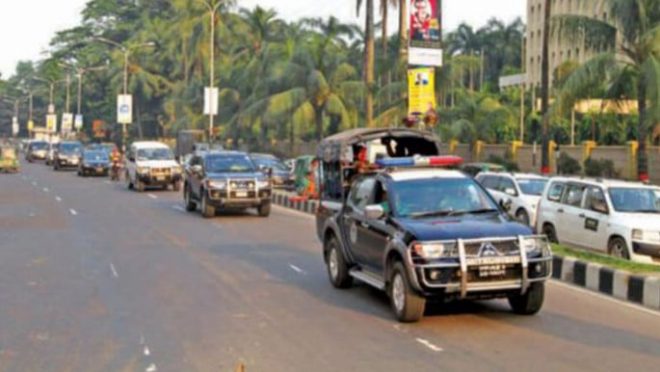VIP movement: Privilege for a few, pain for many
VIP movement: Privilege for a few, pain for many

You’re getting late for an exam, stuck in the traffic. You are trying to cram at the last moment, sitting on the bike along with the increased panic and scorching sun above your head, and you see a big white Pajero going smoothly in front of you, escorted by uniformed police officers. “VIP movement,” your bike rider expresses with mockery in his tone. Luckily, the police let you go, as the VIP had already moved.
This is a very common scenario if you are a regular commuter on the bustling roads of Dhaka. Roads are already filled with chaos and heavy congestion, and VIP movement adds more to this misery. VIP movement refers to the privilege high-ranked officials and top local and foreign bodies enjoy that gives them a smooth commuting experience in cities like Dhaka where general commuters have to wait hours on the road to get to their destination.
It clearly depicts a shabby image of how the state is treating people based on their designation in society. Rather, it should have been a basic right for all commuters. Yes, it is apparent that high officials need more security while they move, but it cannot be at the cost of the time of the general mass. Like their time has value, so does the time of a schoolchild or an office goer who might have an exam or an important meeting.
More ridiculously, vehicles are blocked even when the VIPs can move smoothly, just to ensure their safety. Again, it shows a vulnerability in the existing protocol system. What message is it giving to a schoolchild? What does it convey to aspiring university students? Or what does it make an aspiring immigrant feel who is aiming to contribute to the country’s GDP? The message is simple: everyone is not so significant in the country.
What is more saddening is that we expected this to change after the July revolution last year. Even a video of the Chief Advisor’s car waiting in the traffic went viral. This made us hopeful. Finally, everyone would have the same experience. And it made us believe that when the top officials would face the pain and sufferings in the traffic, they would be more concerned with Dhaka’s traffic congestion. They might come up with some viable solution that not only gives them a smooth riding experience but also alleviates the long-endured sufferings of the city.
But sadly enough, this has not changed, and the student leader who got to serve at the premium level now enjoys the same privilege as before. They also are from a very humble background, and if they do not address these issues now, there is very little hope that it might change.
The scenario is not so different outside of the capital. In 2022, Titas Ghosh, a school-going student, breathed his last in an ambulance stuck at Madaripur’s Kathalbari ferry ghat for three hours as the ferry was waiting for a ministry joint secretary, a so-called VIP. A report by The Business Standard shows this tragedy. It is outrageous as it not only kills our time but also snatches away human lives.
What is more outrageous is that the law does not permit any of these officials to enjoy the privilege except the President and prime minister. “The wishful movement in the name of VIP does not support any law of the country,” said Supreme Court lawyer Barrister Jyotirmoy Barua (The Business Standard, 2022). These unlawful activities should not continue unabated.
Our authorities and concerned civil societies must come forward against these regular illegal activities. The privilege the top officials enjoy cannot be at the price of the mass sufferings. Rather, the top authority should be in the shoes of normal people and work relentlessly to mitigate their suffering. It sounds like a farce, but it is their major duty as public servants.
The police, who mainly ensure the journey of top officials goes smoothly, also need to make the commute as smooth as possible for the general public. Their duty is not to make a gridlock deliberately to facilitate the journey of one or a few fleets, but to make the journey of all commuters hassle-free. That is how they can regain the trust and belief that has been long lost.
Dhaka is already the slowest city in the world, according to a study by the US-based National Bureau of Economic Research in 2023 (The Daily Star, 2023). It would be audacious if our bureaucrats, top police officers, or members of parliament do not stop enjoying the privilege. They would make the slowest city even slower.
Contrary to what they should or should not do, they must uphold the democratic rights of the people, definitely by not portraying clear discrimination on the roads in broad daylight.
Sources:
- The Business Standard (2022). VIP movement on roads: Do rules allow it? Retrieved from: https://www.tbsnews.net/bangladesh/transport/vip-movement-roads-do-rules-allow-it-415830
- The Daily Star (2023). Traffic movement: Dhaka ranked slowest in world. Retrieved from:
https://www.thedailystar.net/news/bangladesh/news/traffic-movement-dhaka-ranked-slowest-world-3430866?


